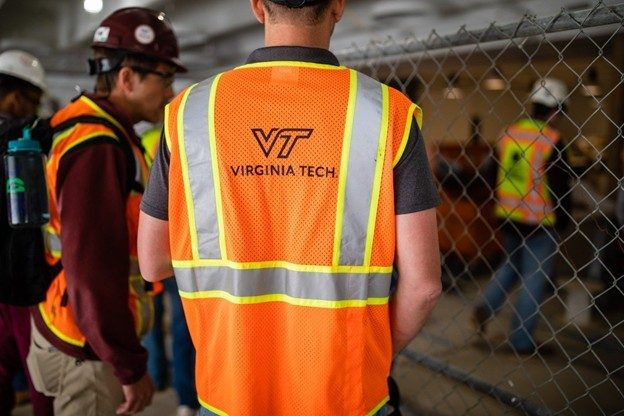A group of Virginia Tech researchers just got a boost toward bulldozing the construction industry’s biggest challenges.
The Coalition for Smart Construction recently announced the recipients of its first seed grants.
Created to build on the university’s transdisciplinary strengths and collaborative culture, the coalition helps faculty make connections with each other, industry, and government to find innovative, workable solutions to complex problems.
The coalition’s first seed grants are administratively housed in the Institute for Critical Technology and Applied Science, with support from the Hitt Family Foundation and the Office of Strategic Research Alliances.
The coalition selected five initial projects for the seed grants. The grants ranged from $30,000 to $75,000 apiece, totaling $280,000. Each project aims to modernize the construction industry and set the stage for large-scale investments down the road.
“This opportunity is about researchers and industry members working together to take the construction industry to the next level,” said Brett Hitt, co-chairman of HITT Contracting. “With faculty and industry input, we were able to identify specific growth areas where we want to see progress. Our hope is that this funding will jump-start projects that address concerns in these areas, leading us into the future of construction.”
The initiative aims to support projects that fall into one or more of the following growth areas, including:
- Advanced materials and manufacturing
- Construction operations
- Energy
- Sustainability
- Digital and human interfaces
The projects receiving support are:
3D Printed Concrete Enabled by Real-Time Tracking of Print Quality and Properties
Research themes addressed: Construction operations and digital and human interfaces.
Goal: To use artificial intelligence to track printed concrete quality and to use surface waves to track the setting times of the printed concrete. This will address the industry’s need for real-time tracking of print quality and material strength assessment.
Reseach team:
- Alexander Brand, assistant professor, civil and environmental engineering
- T.A. Kamakshi, postdoctoral researcher, civil and environmental engineering
- Zhenyu “James” Kong, professor, industrial and systems engineering
- Andrew McCoy, professor, school of construction
- Nathan King, assistant professor, school of architecture
- Q. Tran, assistant professor, civil, environmental, and geospatial engineering, Michigan Tech
- Michael White, chief executive officer, Crain Company 3D, Crain Impact
Blocked: Affordable Customizable Modular Housing via Computational Design and Digital Fabrication
Research themes addressed: Construction operations and advanced materials and manufacturing.
Goal: Develop and test a customizable modular construction system, based on an adjustable set of parameters, using oriented strand board sheets, cut into parts by computer numerical control milling machines.
Research team:
- Ramtin Haghnazar, assistant professor, school of architecture
- Mehdi Setareh, professor, school of architecture
- Ali Shojaei, assistant professor, school of construction
- Vahid Nasir, assistant professor, wood and science engineering, Oregon State University
- Babak Vakilzadeh, principal structural engineer, Ziggurat Bold Designers, Ontario, Canada
Setting the Stage for the Coalition for Smart Construction Mass Timber and Construction Hub for Innovation Lab
Research themes addressed: Advanced materials and manufacturing and sustainability.
Goal: To launch a first-of-its-kind construction prototyping facility centered around mass timber construction. The facility will improve construction efficiency, and enhance workforce development.
Research team:
- Daniel Hindman, associate professor, sustainable biomaterials
- Brian Bond, professor, sustainable biomaterials
- Adam Phillips, associate professor, civil and environmental engineering
- Edward Becker, associate professor, school of architecture
Automated Modular Sub-Assembly for Affordable Housing using Precision Interlocking Oriented Strand Board and Engineered Wood Panels
Research themes addressed: Construction operations and advanced materials and manufacturing.
Goal: To develop and validate a process and technology for an industrialized construction system that optimizes digital fabrication, automation, and human labor.
Research team:
- Adam Phillips, associate professor, civil and environmental engineering
- Hongrui Yu, assistant professor, civil and environmental engineering
- Tripp Shealy, associate professor, civil and environmental engineering
- Daniel Hindman, associate professor, sustainable biomaterials
- Max Ofsa, 3D Design Studio Manager, University Libraries
Transforming Precast Concrete Construction through a Cradle-to-Cradle Approach
Research themes addressed: Sustainability, construction operations, and digital human interfaces.
Goal: To explore a cradle-to-cradle approach for building design and construction using precast concrete elements to reduce the massive accumulation of construction and demolition waste.
Research team:
- Tanyel Bulbul, associate professor, school of construction
- Jim Jones, professor, school of architecture
- Sean McGinnis, professor of practice, civil and environmental engineering
- Metromont: Precast Concrete Manufacturer, Winchester, Virginia
- Precast/Prestressed Concrete Institute Mid-Atlantic, Chicago, Illinois
The projects were chosen in January and are underway. Findings will be presented at a research showcase to highlight opportunities to extend the initial work and spark promising new collaborations.
“Seed money like this is especially valuable because it allows us to pursue ideas of tremendous potential and lay the groundwork for much larger proposals for support down the road,” said Virginia Tech Associate Vice President for Strategic Resources Jon Porter. “We take pride in our faculty’s eagerness to collaborate with both industry and each other to apply their skills to critical questions in construction. And we are particularly grateful to the Hitt Family Foundation for its generous financial support for these projects.”
Plans to build a Coalition for Smart Construction came into focus in 2023, in connection with an expanding partnership with HITT Contracting. Along with helping seed early stage research, it brings Virginia Tech experts together with industry and government stakeholders to share ideas.
The coalition’s physical footprint will eventually be expanded to include 40,000 square feet on the ground floor of a new headquarters HITT Contracting is building in Falls Church, Virginia. Ground was broken in February 2025, and the building is projected to open in 2027.
By Lexi Clatterbuck and Albert Raboteau


